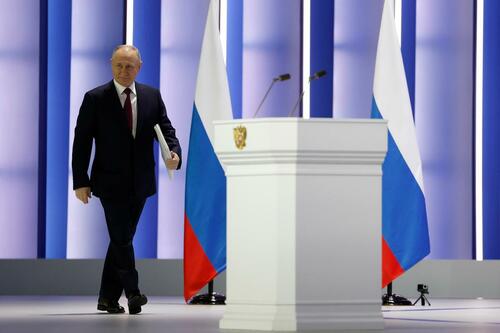President Vladimir Putin on Thursday signed into effect a law which paves the way for potential Russian nuclear testing, which would mark a huge escalation given the context of the Ukraine war and the broader context of a 'new Cold War' standoff between Washington and Moscow.
The new law confirms Russia’s de-ratification of the Comprehensive Nuclear Test Ban Treaty (CTBT), which is the 1996 landmark agreement which sought to ban all nuclear testing and explosions, in order to bring Russia and the United States in line on the issue.

But the two sides were never really in line on the question of the treaty itself, even if nuclear tests weren't happening. Some countries which were integral to the treaty never fully ratified it.
The Kremlin earlier last month said it would take steps to "mirror" the US position, explained as follows:
The law’s text on Russia’s legal portal states that Moscow will no longer be bound by the UN-backed nuclear test ban starting Nov. 2. Both Russia and the United States signed the treaty in 1996, but while Moscow ratified it in 2000, Washington never took the final step of codifying it into law.
Other holdouts to the treaty include China, India, Pakistan, North Korea and Israel, as well as Egypt and Iran...
"The president was primarily referring to the need to bring the de facto situation to a common denominator [with the U.S.]," Kremlin spokesman Dmitry Peskov said in October, and has denied that this means Russia intends to pursue nuclear tests.
However, both Russia and the US have recently conducted "drills" of their nuclear armed strategic forces, but without actually conducting nuclear testing. Such a move would be hugely controversial also domestically, particularly in the US, given environmental and fallout concerns.
Some commentators are seeing in this latest move a fresh "threat" to keep the Western alliance on edge...
A year ago, Putin dropped his threats to use a nuclear weapon against Ukraine following warnings from the US and China.
— max seddon (@maxseddon) November 1, 2023
Now, Russia is looking for ways to keep those nuclear tensions at a simmer – and deter the west from ramping up its support for Kyiv:https://t.co/Xmc2nXmr7t
The Ukraine war has for much of the past year-and-a-half witnessed nuclear saber-rattling, particularly after President Putin ordered that tactical nuclear weapons be moved into Belarusian territory. But this rhetoric has calmed of late. Russia has defended the move given the US keeps tactical nukes in several NATO states as part of NATO's 'nuclear deterrent' arsenal. This includes Turkey, which is just across the Black Sea from Russia.
